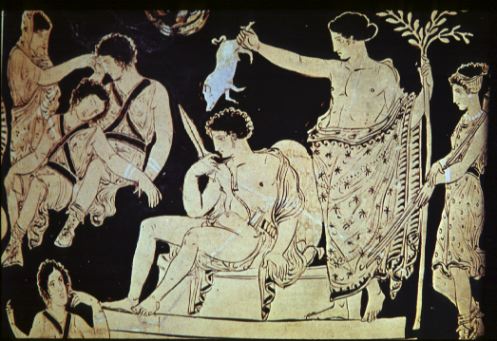GREEK TRAGEDY
Dr. Annette Giesecke

Orestes at Delphi beign purified by Apollo with Clytaemnestra
and Sleeping Furies in attendance.
(attributed to the Eumenides Painter,from an Apulian
vase 380-370 BCE, collection of the Louvre)
GREEK TRAGEDY
Dr. Annette Giesecke

Orestes at Delphi beign purified by Apollo with Clytaemnestra
and Sleeping Furies in attendance.
(attributed to the Eumenides Painter,from an Apulian
vase 380-370 BCE, collection of the Louvre)
Aims: The aim of this course is to provide students with a broad overview of Greek tragedy, both in its development as a genre and in its physical production. Select works by the three foremost ancient Greek tragedians, Aeschylus, Sophocles, and Euripides, will be examined. At the end of the term, we will also take a brief look at the afterlife of Classical Greek tragedy. Special attention will be given to theme, character, manipulation of myth, gender issues, and socio-political relevance generally.
Requirements: One paper (students will be asked to write their
own Greek tragedy with reader's guide- details supplied below); two quizzes;
a midterm & final exam. [NB: the examinations and quizzes must
be taken at the scheduled time except under circumstances described
under "attendance policies" in the Undergraduate Catalog. The same holds
true for the paper's due date.]
Texts: The following texts are required reading for the course:
Aeschylus I: The Oresteia, David Grene and Richmond Lattimore, eds. (CUP, 1953)Sophocles 1: Oedipus the King, Oedipus at Colonus, Antigone, D. Grene and R. Lattimore, eds. (CUP, 1954)
Sophocles 11: Ajax, Women of Trachis, Electra, and Philoctetes, D. Grene and R. Lattimore, eds. (CUP, 1957)
Euripides 1: Alcestis, The Medea, The Heracleidae, Hippolytus, D. Grene and R.Lattimore, eds.
Euripides 11: The Cyclops and Heracles, Iphigeneia in Tauris, Helen, D. Grene and R.Lattimore, eds. (CUP, 1956)
Euripides V: Electra, The Phoenician Women, The Bacchae, D. Grene and R. Lattimore,eds. (CUP, 1959)
Supplementary Reading: recommended for those interested but not
required
Goldhill, S. Reading Greek Tragedy (Cambridge: 1986)Green, J. R. Theatre in Ancient Greek Society (London: 1994)
Knox, B. The Heroic Temper: Studies in Sophoclean Tragedy (Berkeley: 1974)
Word and Action: Essays on the Ancient Theater (Baltimore: 1979)
Lattimore, R. Story Patterns in Greek Tragedy (London: 1964)
Ley, G. A Short Introduction to the Greek Theater (Chicago: 1991)
Meier, C. The Political Art of Greek Tragedy (Baltimore: 1988)
Segal, E., ed. Greek Tragedy : Modern Essays in Criticism (New York: 1983)
Taplin, O. Greek Tragedy in Action (London: 1993)
Winnington-Ingram, R P. Sophocles: An Interpretation (Cambridge: 1980)
Studies in Aeschylus (Cambridge: 1983)
* * * * * Women in Antiquity, J. McAuslan and P. Walcot, eds. (Oxford: 1996)
Women in Antiquity: New Assessments, R. Hawley and B. Levick, eds. (London: 1995)
Women and Slaves in Graeco-Roman Culture, S. R. Sloane and S. Murnaghan, eds. (London: 1998)
Women in the Classical World: Image and Text, E. Fantham et al. eds, (Oxford: 1994)
Feminist Theory and the Classics, N. Sorkin-Rabinowitz and A. Richlin, eds. (New York 1993)
Women in Greece and Rome, M. R. Lefkowitz and M. B. Fant, eds. (Toronto: 1977)
Foreign Languages and Literatures Home Page
Department of Foreign Languages
and Literatures
30 East Main Street, University of
Delaware, Newark DE 19716
(302) 831-6882